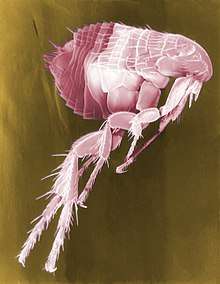flea
See also: fleá
English
Etymology 1

False colors scanning electron micrograph of a flea.
From Middle English fle, from Old English flēah, flēa, from Proto-Germanic *flauhaz (compare West Frisian flie, Low German Flo, Flö, Dutch vlo, German Floh, Icelandic fló), from pre-Germanic *plóukos, *plówkos, from Proto-Indo-European *plúsis (compare Latin pulex, Sanskrit प्लुषि (plúṣi)).
Noun
flea (plural fleas)
- A small, wingless, parasitic insect of the order Siphonaptera, renowned for its bloodsucking habits and jumping abilities.
- A thing of no significance.
- 1871, Fitz Hugh Ludlow, The Heart of the Continent, page 414:
- The nation of beggars on horseback which first colonized California has left behind it many traditions unworthy of conservation, and multitudinous fleas not at all traditional, but even less keepworthy […]
-
Derived terms
- deflea
- fleabag
- flea collar
- flea comb
- flea market
- flea-ridden
- sand flea
- sandfly
Translations
parasitic insect
|
|
Etymology 2
Alternative forms.
Verb
flea (third-person singular simple present fleas, present participle fleaing, simple past and past participle flead)
- Obsolete spelling of flay
- 1749, Henry Fielding, Tom Jones, Folio Society 1973, p. 74:
- In this Thwackum had the advantage; for while Square could only scarify the poor lad's reputation, he could flea his skin [...].
- 1749, Henry Fielding, Tom Jones, Folio Society 1973, p. 74:
This article is issued from
Wiktionary.
The text is licensed under Creative
Commons - Attribution - Sharealike.
Additional terms may apply for the media files.